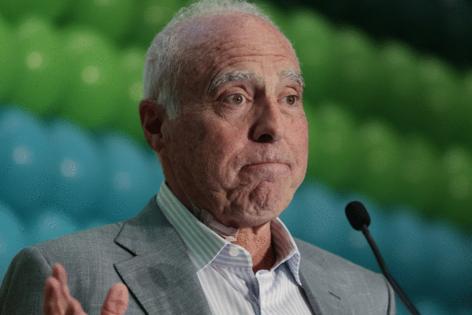Marcus Hayes: Jeffrey Lurie and the Eagles finally stand as the NFL's model franchise as a new stadium looms
Published in Football
PHILADELPHIA — Jeffrey Lurie has spent 31 years building his kingdom. Allow him this moment of triumph.
Entering the 2025 season, the Eagles are defending Super Bowl champions, have won the Lombardi Trophy twice in seven years, have gone to two of the last three Super Bowls, and are among the favorites to win it again, despite losing offensive coordinator Kellen Moore and several veteran players.
They have a franchise quarterback, an abundance of star players, and, thanks to superb drafting, clever salary-cap management. And with Lurie’s willingness to give veteran players cash early in their deals, the team’s best players are, generally speaking, at least slightly underpaid.
And, after a recent sale of minority ownership stakes, are estimated to be worth $8.3 billion — or about 45 times the value of Lurie’s initial investment of $185 million.
It is never the goal of a king to win one battle in a war. It always is the goal of a king to establish a kingdom that has every chance to remain relevant, if not dominant. Lurie has accomplished just such a goal.
After decades of looking up at the Patriots and Chiefs, his, finally, is the model franchise. There’s a good chance that this still will be the case when the lease at Lincoln Financial Field creeps toward expiration in 2032, which is a year after the Flyers and Sixers plan to open their new shared arena. It’s always easier to sell cities and states on investing in a roughly $4 billion stadium when the team is on top.
How did this happen?
More than anything else, Lurie hired, groomed and empowered the best general manager in football, Howie Roseman, and did so in his own image. Roseman has grown to be a fearless manager of finances, a superb innovator, an elastic thinker, and a fine judge of athletic talent, character and intelligence.
Secondly, Lurie, 73, has positioned his son, Julian, to succeed him sooner rather than later. There’s no telling if the sweet, shy young man will be an effective executive or a powerful owner, but if he’s not, it will not be for lack of education and preparation.
Third, Lurie has established a culture of inclusion and emotional intelligence that amplifies, if not maximizes, the limits of performance of everyone associated with the organization, from the front office to the playing field to the grounds crew. The Eagles aren’t exactly a family, but they’re not really a business, either. They generally are a collection of like-minded people who understand that their cooperative efforts always will exceed scrambling for personal gain or glory.
Oh yes:
The players and coaches.
They are, in their combination, the reason this is the apex, the zenith, the absolute high point of the franchise’s existence. It is unlikely, given the restrictions of the salary cap and the fickle nature of a violent, brutal sport, that there will be a better foundation that combines talent, experience and chemistry the way the 2025 Eagles do.
In loose order of importance:
Jalen Hurts, because he’s the quarterback.
Saquon Barkley, the best running back in team history.
Right tackle Lane Johnson, the team’s best player.
Jalen Carter, a third-year tackle who was the heart of the league’s best defense last year.
A.J. Brown, a Hall of Fame receiver toiling in the shadows of less capable men.
Jordan Mailata, who protects Hurts’ blind side.
Quinyon Mitchell, a second-year cornerback destined for greatness.
Landon Dickerson, who, with Mailata, forms the best left side of any team’s offensive line.
DeVonta Smith, who would be a No. 1 receiver on almost any other team.
Cooper DeJean, a four-position defensive back in just his second season.
Dallas Goedert, the team’s all-time leading postseason receiver, who blocks at tight end as well as he catches.
Cam Jurgens, who replaced Jason Kelce as, incredibly, an upgrade.
Zack Baun, a late bloomer but a perfect fit as a Philly linebacker.
Edge rusher Nolan Smith, who, like Jurgens, stepped into a legend’s shoes — in his case, Brandon Graham’s — and made the position even better.
Think about it.
There has never been a combination of this many frontline, cornerstone players in the history of the Eagles franchise.
For that matter, since the salary cap was introduced in 1994, there probably hasn’t been another NFL team with this degree of depth, youth, health, character and professionalism.
It is a tribute to the magnificence of the roster that offensive line coach Jeff Stoutland, defensive coordinator Vic Fangio, and head coach Nick Sirianni — an imposing trio of instructional, tactical and executional minds — are the least significant elements in the kingdom Jeffrey Lurie has built.
And then, of course, there is the man himself.
©2025 The Philadelphia Inquirer, LLC. Visit at inquirer.com. Distributed by Tribune Content Agency, LLC.







Comments